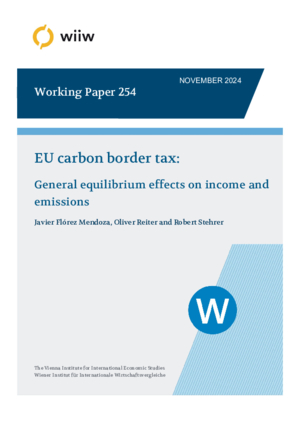EU carbon border tax: General equilibrium effects on income and emissions
Javier Flórez Mendoza, Oliver Reiter and Robert Stehrer
wiiw Working Paper No. 254, November 2024
85 pages including 11 Table and 36 Figures
This paper employs a quantitative trade model to globally assess the implications of the EU carbon border adjustment mechanism (CBAM) on trade flows, welfare, real wages and CO2 emissions. We quantify the general equilibrium effects on EU members and non-members under various carbon tax prices, including a sector-level composition, and also compare the results to a scenario including export rebates. For the EU, we find an increase in the terms of trade and, consequently, small positive welfare effects, although there are tiny negative effects on real wages. Non-EU countries face a decline in the terms of trade and a small welfare loss as well as marginally declining real wages. Global CO2 emissions are marginally reduced, but they slightly increase in the EU due to specialisation effects.
Keywords: New quantitative trade model, carbon border adjustment mechanism (CBAM), trade policy welfare, CO2 emissions
JEL classification: F11, F13, F14, F18, Q56
Countries covered: non specific
Research Areas: International Trade, Competitiveness and FDI
